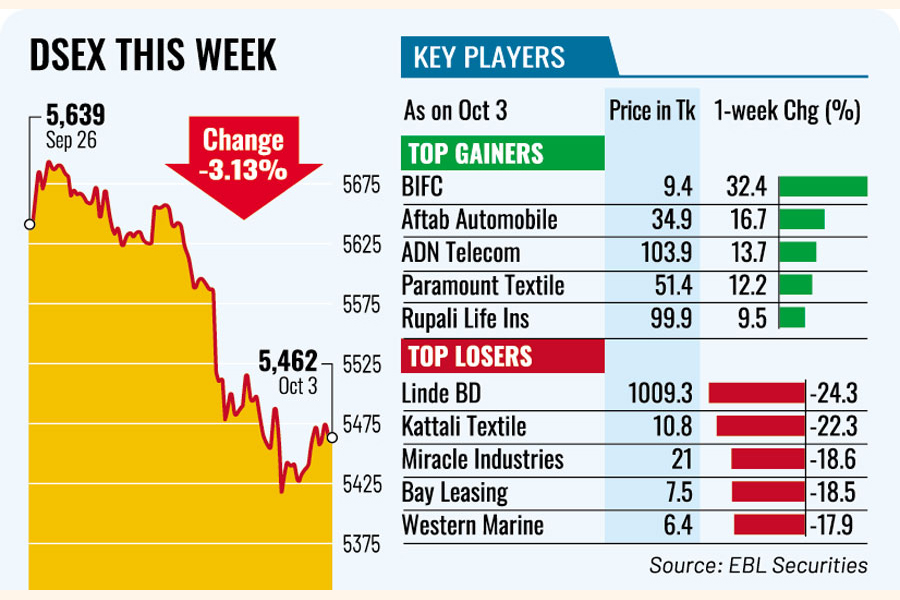
Published :
Updated :

 Stocks continued their downward spiral this week, sparking protests from investors, as a series of strict regulatory measures, policy changes, and rising interest rates have dampened investor sentiment, contributing to volatility in the market.
Stocks continued their downward spiral this week, sparking protests from investors, as a series of strict regulatory measures, policy changes, and rising interest rates have dampened investor sentiment, contributing to volatility in the market.
The market has remained bearish over the past two months, and the grim economic outlook stemming from the recent Middle East crisis has led many investors to sit on the sidelines.
This week saw massive selling pressure, particularly after the securities regulator imposed a record fine of Tk 4.28 billion on nine individuals and institutions. This led to the largest single-day drop in 31 months on Wednesday.
Protesting the sharp fall, a group of aggrieved investors staged demonstrations in front of the DSE old building at Motijheel and Bangladesh Securities and Exchange Commission (BSEC) office at Agargaon in the last two days of the week.
They demanded immediate resignation of the chief of the capital market watchdog, for what they said was his failure to bring back normalcy in the market.
Market operators said the record penalty imposed on the Beximco's share price manipulators, combined with escalating tensions in the Middle East, contributed to the market plunge as oil price climbed on the global market.
Furthermore, rising interest rates, a slowdown in business activities, and anticipation of disappointing corporate earnings in the coming weeks have all contributed to the downturn in the market.
Such developments have put the investors under pressure. As a result, the market saw a sharp fall in three sessions of the week while two others managed to end marginally higher.
DSEX, the prime index of the Dhaka Stock Exchange (DSE), plummeted more than 176 points or 3.13 per cent to settle the week at 5,462. The DSEX lost 272 points in the past two straight weeks.
The blue-chip DS30 index, a group of 30 prominent companies, also fell 74 points to 1,991 while the DSES index, which represents Shariah-based companies, shed 41 points to 1,221.
Price erosion of large-cap stocks such as Islami Bank Bangladesh, BAT Bangladesh, Beacon Pharma, BATBC, Linde Bangladesh, Renata, Grameenphone and Olympic largely contributed to the index plunge. They jointly accounted for one-third of the index fall.
This week, Tk 135 billion was wiped out from the market capitalisation of the DSE, which now stands at Tk 6,721 billion.
The market-cap is calculated by multiplying the total number of a company's outstanding shares by the current market price.
"The market logged extreme hurdles this week, with investors bearing the brunt of intense bearish sentiment across the trading floor triggered by the abrupt regulatory measures and policy changes," said EBL Securities.
The potential interest rate hikes following the Bangladesh Bank's decision to raise the policy rate also dampened investor confidence, said the stockbroker.
The latest policy rate hike of 50 basis points, amid a tightened monetary space, has intensified concerns among stock investors.
The rising interest rates that already made fixed-income instruments more lucrative as compared to stock market return while further possible interest rate hikes exacerbated the market situation, said a stockbroker.
Md Ashequr Rahman, managing director of Midway Securities, said tensions built among prudent investors in response to the escalating situation in the Middle East are quite rational.
"But it's quite irrational if the market faces any impact of the regulatory actions taken against the manipulators," he argued.
Mr Rahman noted that due to longstanding malpractices in the market, investors often react negatively to measures intended to enforce discipline in the market.
Turnover, a crucial indicator of the market, tumbled to Tk 21.31 billion this week, as against Tk 33.96 billion in the week before.
Subsequently, the average daily turnover came down to Tk 4.26 billion, down 37 per cent from the previous week's average of Tk 6.79 billion.
Investors were mostly active in the banking sector, which accounted for 29 per cent of the week's total turnover, followed by pharma sector (15 per cent) and power (7 per cent).
More than 83 per cent traded stocks saw price fall, as out of 396 issues traded, 331 declined, 57 advanced and eight remained unchanged.
All the sectors faced selling pressures and closed in the red. Among the major sectors, engineering saw the highest correction of 5.05 per cent. It was followed by non-bank financial institutions, food, power, telecom and banking sectors.
Islami Bank was the most-traded stock with shares worth Tk 1.16 billion changing hands, closely followed by Grameenphone, Brac Bank, Social Islami Bank and MJL Bangladesh.
The Chittagong Stock Exchange (CSE) also tumbled, with the CSE All Share Price Index (CASPI) shedding 522 points to settle at 15,272 and its Selective Categories Index (CSCX) losing 296 points to close at 9,275.
The port-city bourse traded 11.77 million shares and mutual fund units with turnover value of Tk 411 million.
babulfexpress@gmail.com


 For all latest news, follow The Financial Express Google News channel.
For all latest news, follow The Financial Express Google News channel.